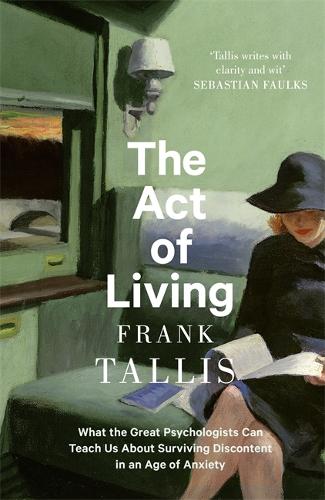
The Act of Living: What the Great Psychologists Can Teach Us About Surviving Discontent in an Age of Anxiety
(Hardback)
Available Formats
Publishing Details
The Act of Living: What the Great Psychologists Can Teach Us About Surviving Discontent in an Age of Anxiety
By (Author) Frank Tallis
Little, Brown Book Group
Little, Brown
13th April 2021
14th January 2021
United Kingdom
Classifications
Tertiary Education
Non Fiction
158.1
Physical Properties
Hardback
352
Width 160mm, Height 238mm, Spine 34mm
600g
Description
'Tallis writes with clarity and wit' Sebastian Faulks
Science, technology and western liberal democracy have all had a dramatic impact on our quality of life. Compared to previous generations, we have unprecedented access to information, increased personal freedom, more material comforts and more possessions. Yet, even before the shock of Covid-19, more people than ever before were reporting being depressed, anxious or unfulfilled. As our material circumstances become easier, life seems to get harder. Why should this be Shelves sag under the weight of self-help manuals and the internet is awash with the advice of role-models and celebrity gurus; however, to what extent can these sources be expected to supply meaningful, practical answers - the kind of answers relevant to sceptical individuals living in a modern, technologically advanced culture For over a hundred years, psychotherapists have been developing and refining models of the human mind. They have endeavoured to alleviate distress and they have offered help to people who want to make better life choices. Although the clinical provenance of psychotherapy is important, the legacy of psychotherapy has much wider relevance. It can offer original perspectives on the big questions usually entrusted to philosophers and representative of faith: Who am I Why am I here How should I liveIn this compelling and important book, the principle contributions of the outstanding figures associated with the practice of psychotherapy are explained: from Freud to Ellis, Jung to Laing, Adler to Hayes. Viewed as a single, cohesive intellectual tradition, Frank Tallis argues that psychotherapeutic thinking is an immensely valuable and under exploited resource.Reviews
Tallis writes with clarity and wit
Tallis has distilled a wide range of psychological writing without oversimplifying the insights or reducing them to self-help platitudes . . . Tallis is an engaging writer and this is at heart a highly readable, often touching history of the talking cures and some of their most brilliant exponents -- Sebastian Faulks * Sunday Times *
Psychology has its rogues and charlatans but this history reminds you it is a force for good . . . his writing is brisk and clear, his narrative is both thematic and roughly chronological, which is no easy feat of organisation, and studded with heavily disguised case histories -- David Aaronovitch * The Times *
Few psychotherapists write with the clarity of Tallis . . . He also peppers the book with delightful nuggets from the psychological world . . . a gifted storyteller * The Tablet *
An engaging and expansive tour of our modern-day therapeutic landscape * Times Literary Supplement *
Author Bio
Dr Frank Tallis is a writer and clinical psychologist. He has held lecturing posts in clinical psychology at the Institute of Psychiatry and neuroscience at King's College London. He has published over 30 scientific papers in international journals and has written a textbook on cognitive and neuropsychological aspects of Obsessive Compulsive Disorder (OCD). He has written three works of psychology for the lay reader: Changing Minds (a history of psychotherapy), Hidden Minds (a history of the unconscious) and Lovesick (an exploration of the relationship between romantic love and mental illness).
